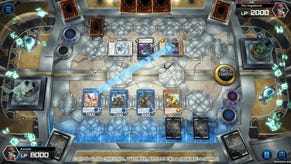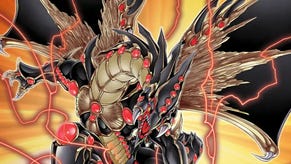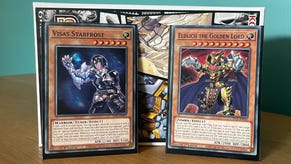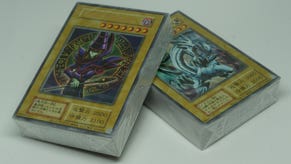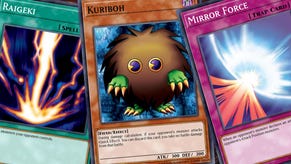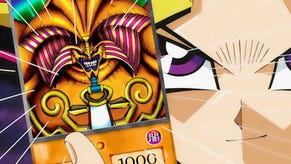An introduction to Yu-Gi-Oh! Rush Duel, the faster, simpler reboot breathing fresh life into the TCG
Why you should play Rush Duel, if you ever can.
If you’re a Yu-Gi-Oh! player looking for a different experience to the card game you know and love, what do you play? For those outside of Japan and Korea, there’s Speed Duel. Using many of the same cards with a smaller card pool and new rules, the game offers a speedier twist on standard play. In these regions, however, something else has been revolutionising the look and feel of Yu-Gi-Oh! for a younger generation, modernising the franchise with a revolutionary twist on the familiar game.
Rush Duel is a new format introduced in Japan in 2020 alongside the premiere of the Yu-Gi-Oh! Sevens anime, a series which for the first time centred this new format rather than the traditional TCG. The mode in many ways offers an evolution to the promises made with Speed Duel, retaining the game’s removal of Extra Monster and Pendulum Zones to simplify the playing field while switching up the rules for a more accelerated style of play.
Just like traditional rules, players start with 8000 life points and can have between 40 and 60 cards in their main deck. However, instead of limiting players to a single Normal Summon per turn, players can summon as many monsters as they want in a single turn.
You also have the introduction of Maximum Summoning, a Rush Duel-specific mechanic for the format’s exclusive Maximum Monsters. These are special monsters made up of three cards, which can be Special Summoned to the field in all three of your Monster Zones if all cards are in your hand at the same time. On the field, they’re treated as a single monster without Defense points similar to Link Monsters in the standard game, although very few exist in the physical game at this time. You also have Legend cards, with players limited to just a single Legend per deck, and Fusion Summons must be performed with cards on the field, not in the hand.
While many cards in the TCG will state whether a card’s effect can only be activated once per turn, the redesigned cards of Rush Duel make this implicit to all cards while face-up on the field.
Rush Duel offers an evolution to the promises made with Speed Duel of simpler gameplay, while switching up the rules for a more accelerated style of play.
As Yu-Gi-Oh! has grown more complex, so have card effects. Cards in Rush Duel have been completely redesigned to separate cost and effect onto separate lines in simplified language, which makes the cards easier to understand. This change has similarly helped to redesign the cards to centre bolder, larger artwork and even Pokémon-style full-art cards in more recent sets, known as Over-Rush Rares. The designs are arguably more appealing, making the constrained artwork of the traditional game look almost old-fashioned by comparison.
The timing on card effects differ too, in turn affecting the timing for counter effects and chain links. In Rush Duel the cost and effect of a card activate at the same time, simplifying the mechanic and making it more difficult to miss timing with counter effects.
This sounds like a lot of change, but what’s the main appeal of all this?

To find out, we picked up the Yudias Velgear and Yuamu Odo starter decks for Rush Duel released at the end of 2022, as well as recent Deck Modification Pack: Fortissimo of the Whirlwinds boosters.
Yuamu Odo’s deck features powerful Dragon-type monsters that you use to flood the field to inflict both battle and chip damage using their high ATK and effects. Many effects in this deck rely on cycling Dragon monsters between the field, graveyard, deck and hand to activate various effects to chip damage, ultimately ending the turn with the most powerful monsters on the field.
The deck’s cover monster, Red-Boot Boost Dragon, can return up to seven Dragon-type monsters in the graveyard to the deck to inflict 100 life points of damage for each. Perhaps even stronger is Terrorstrike Dragon Stock Buster, which lets you send one card from your hand to the graveyard if your opponent has five or more cards on the field to reduce all opposing monster ATK by 1500 until the end of the turn. A high requirement, but not impossible with the nature of the format - and very rewarding.

Rush Duel’s non-existent Normal summon limit and alternative rules on the draw phase (each player draws until they have five cards in hand, rather than a single card per turn) makes Thrust Dragon Bunker Strike more powerful in this format than had the card been introduced in the traditional game. Drawing cards equal to the number of monsters your opponent controls then placing on the bottom or top of the deck in any order the same number of cards is a brilliant way to search for new monsters or effects, especially since you can get even high-level monsters with ease in a single turn through tribute summons with the correct resources.
What helps Rush Duel succeed is how distinct it feels in comparison to standard Yu-Gi-Oh!
Then there’s the deck for Yudias Velgear, whose reliance on Normal monsters similarly points to one of the format’s unique attributes. A clean slate for the card pool eliminates much of the elevated power introduced into the TCG over the years, while the lifting of the summon limit makes the ability to get monsters of any type onto the field just as important as their effects.
The key strategy of this deck is bringing out your most powerful Normal Monsters like Galactica Oblivion and strengthening them with secondary effects. The strongest Effect monster in the deck is Universe Dea, which allows you to drop the ATK of an opponent’s monster by 800, with a recovery of 800 Life Points if you discard a Galaxy-type Normal monster. As all monsters in the deck are Galaxy-type, it’s an effective way to cycle cards into different areas of the field and recover life points.

In playtesting the most effective strategy involved using Universe Dea to send monsters to the graveyard before using the Level 6 Galactica Amnesia’s effect to send one card from your field to the bottom of the deck to Special Summon 2 Level 6 or lower Galaxy-type Normal Monsters from your graveyard. The limitation of no monsters except Galaxy-type monsters attacking that turn is circumvented by the deck being built around this card and type, with cards easily recycled using effects like Cyclinne and Tranzam Klein.
Support spell and trap cards synergise well in this deck as Vacua Annihilation (destroys ATK position monsters on your opponent’s field for every Galaxy Normal monster you control when they declare an attack) only further aid this deck's strength.
It’s a fast, fun deck using the Normal monsters you rarely see in other formats of Yu-Gi-Oh! anymore, replenishing and recycling its field easily every turn with plenty of ways to protect key cards. Also, the designs of some of the Galaxy Monsters are just cute, and that isn’t a bad thing!
What helps Rush Duel succeed is how distinct it feels in comparison to the standard game. To spend 20 minutes playing complete matches against opponents where the momentum shifted regularly between both players felt exciting compared to occasions playing the TCG spent watching your opponent endlessly play with themselves for minutes on end, and a board often so overpowering it can be far more difficult to switch the momentum of battle.
Rush Duel's rebellious, youthful spirit has injected new life into the long-running game.
Yet the appeal of Rush Duel goes beyond a mere desire for a new experience, embodied by the accompanying anime. Yu-Gi-Oh! Sevens centres the character of Yuga Odo, a kid who loves to both invent and duel. They invent Rush Duel and its all-new ruleset because they find the standard ruleset restrictive, stifling and slow. The framing of this as a rebellious and exciting new game by and for kids is a big reason for the game’s success with a primarily younger audience; this is the new, hip, cool way to play that’s not the same as the game your older siblings or parents may be familiar with, and it’s a rebellious, youthful spirit that has injected new life into the long-running game, and it worked. As publisher Konami admitted in its 2022 financial report, the anime and cards can be thanked for increased interest among young consumers.
Rush Duel won’t ever replace standard Yu-Gi-Oh!, but its success has firmly established it as a viable alternative in a way that Speed Duel has failed to inspire internationally. It offers not just lessons for the official game to take note of when it comes to things like card design, but it stands apart as a fully-realised experience for all to enjoy. My time with the game may have been brief, but I’m left wanting to play more. I’m only left wondering when the rest of the world can rush to their local card shop for this new way to duel.




